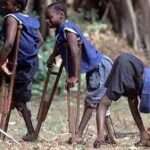By Hassan Zaggi
Since the Russia-Ukraine crisis began on February 24, the World Health Organisation (WHO) and partners have continued to make consistent efforts in shipping medication and medical equipment into Ukraine to save lives and maintain health services.
In a statement Monday, the WHO said as a health cluster lead agency, it is working with partners to “alleviate shortages of life-saving equipment and medication, such as oxygen and insulin, surgical supplies, anaesthetics, and transfusion kits to collect, test and safely transfuse blood.
“Oxygen generators, generators to maintain electrical supply in affected health facilities, defibrillators, monitors, anaesthesia drugs, rehydration salts, gauze and bandages are among the medical supplies WHO and partners are shipping into Ukraine to save lives and maintain health services.”
It however, noted that it has consistently worked around the clock to ensure a constant flow of health supplies so that neighbouring countries have the infrastructure and expertise to meet urgent needs of refugees, and to support Ukraine’s health system to meet the immediate health needs of people within Ukraine’s borders.
The statement revealed that the current estimated number of people impacted in Ukraine is 18 million, of which 6.7 million are internally displaced. Nearly 3 million people have fled the country. Supply chains have been severely disrupted.
Many distributors, according to the statement, are not operational, some stockpiles are inaccessible due to military operations, medicine supplies are running low, and hospitals are struggling to provide care to the sick and wounded.
“WHO is coordinating with partners the provision of humanitarian health assistance, both within Ukraine and on its borders, and providing technical support and surge staff.
“WHO is providing support across Ukraine through the Country Office, the Regional Office for Europe in Copenhagen, as well as from its headquarters in Geneva,” the statement said
It further noted that in order to support operations in and into Ukraine, a WHO support hub is being established in Poland and that it has also scaled up surveillance and health information dissemination to detect and respond to outbreaks early and better understand needs, threats and health service availability.
“WHO and partners have updated the Public Health Situation Analysis for Ukraine, covering health needs and threats to the population.
“WHO and the Health Cluster also launched the mapping tool 3W, showing who does what and where. Event-based surveillance activities for various potential hazards are also ongoing, including through Epidemic Intelligence from Open Sources (EIOS),” the statement revealed.



